The Spectacle of the Individual
| 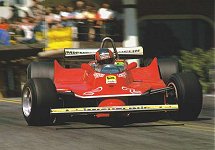 |
 Ronnie Peterson | I first had the notion to write about motor sport way back at the tail end of the '80s, as some kind of a riposte to an article I read in which a string of characters were depicted as being in some way in possession of attributes that made them strangely unpredictable; as damned by a self-destructive streak as they were blessed with some massive talent. It seemed to me to be lazy and, frankly, boring, that one of these characters was a sportsman and that more than this, he was a soccer player. I call the game played by twenty two people kicking a round ball 'soccer' for a couple of reasons. Actually that's a lie because there's only one reason: it pisses off British people who insist it is called Football, and who seem to insist that the world revolves around it. In truth I have no real problem with the fact that they think this, but what I do take issue with is the way that is forced on me. I know it is to be expected, but I think that the next spotty little oik who asks me who I support is going to get a fist in their ugly gob. I mean, I tried answering the question with 'Ferrari' for a while but no-one got the point, and besides I always wanted to qualify that statement with something along the lines of 'but I don't really like Michael Schumacher, and my support is based on other historic reasons…' but you know that would be stupid. No-one would listen. I also despise all the ludicrous advertisements that perpetuate the 'importance' of soccer, diverting attention away from the fact that actually it is a devisive and harmful activity. If you doubt me, go into a typical school these days and see how many arguments are caused by it; see how many hours of learning are lost trying to combat it's all pervasive assumed importance. |
I first started following motor sport when I was 11 because I didn't want to play soccer. It was pretty much that simple: all the other kids were fighting about Rangers and Celtic and I thought that if I liked some other sport entirely it would excuse me the need to take sides. Of course I was naēve; in the south west of Scotland at that time the notion that you could hide from such a vital question was unthinkable, and to not be interested in soccer was of course a tacit admission to homosexuality. I'm quite sure that it remains thus today. The attempt to avoid the beatings that went with supporting the wrong soccer team may have proved in vain (even backfired completely) then, but the interest stuck nevertheless. In those days there was no regular televised motor sport, and the only way to follow events was to read 'grown up' magazines. I thought it was terribly mature to read Autosport instead of Shoot; thought it was terribly clever to have no conception of who on earth Joe Jordan was (aside from the fact that he had no front teeth) but to know that Patrick Depailler had a cool penchant for chain smoking strong French cigarettes and that the JPS Lotus utilised the 'ground effect' system and used skirts. Of course everyone in the playground knew who Niki Lauda was because there was the dreadful joke that punned his name and some had even seen the TV footage showing his burning car at the Nurburgring in '76. Everyone knew James Hunt too, because he was the great English champion and was a thoroughly good bloke to boot. I never liked Hunt as a result of this, although later he did admittedly spice up the BBC coverage of the Grands Prix with his inimitable commentary double act with Murray Walker. | |
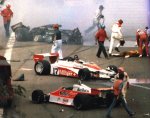 Monza 1978... | My first motor racing hero was Ronnie Peterson. Peterson was a Swedish racer who had, by the time I really took an interest at the start of 1978, signed to race once again with the Lotus team under Colin Chapman. Chapman was a rogue that I personally never took to, and although I would never admit to being a fan of his Lotus team, I have to grudgingly admit that he was responsible for bringing some of the finest racers into the realm of F1 and that he gave us some of the finest looking cars ever to grace a Grand Prix grid. The Lotus 79 of that '78 season was one such car, being dubbed the 'black beauty' by many observers. Peterson had previously driven for Lotus at the start of the '70s when I was barely four or five years old, and very nearly won the drivers championship, being beaten only by his young team-mate, Brazilian Emerson Fittipaldi. After a few years in the wilderness, Peterson returned to Lotus in a supporting role to Mario Andretti. Andretti had weathered several dreadful seasons driving uncompetitive Lotus cars whilst Chapman developed his groundbreaking 'ground effects' system of aerodynamics and was set to reap the rewards: as a result he was not about to have his chances at the championship spoilt by the return of Peterson. The deal was that if Andretti was in front, Ronnie would not attempt to pass, and that Ronnie accepted this situation with good grace says much for his personal integrity. Throughout 1978 the Lotus cars were simply unstoppable. Broadly speaking, if they didn't break down, they won, and they won by miles. Between them, Andretti and Peterson won eight of the first thirteen races of the season and four times they finished in perfect formation; Peterson coming into the chequered flag with his car tucked up behind Mario's. It all came to a crushing end at Monza in Italy on 10th September 1978 when a start line accident left Peterson's car in flames, his legs shattered. First reports were positive, with the expectation of a full recovery, but by the next day, after complications had set in post-operation, Peterson was dead. American artist Frank Stella also seems to have had an affection for Peterson, dedicating one of his 'Polar co-ordinates' print series to the racer. Stella also celebrated racing circuits in artwork, with his series of relief works taking inspiration from the sweeping curves of tracks such as the windswept Zandvoort track in Holland which would regularly be covered in sand from the dunes that lined it. |
 Patrick Depailler | After Peterson's death I seemed to have bad luck with the drivers I choose to take as favourites, although not as bad luck as the drivers themselves. I thought Patrick Depailler was great because he looked so Gallic and rugged. He also drove for Ligier, which had become my favourite team in 1979 mainly because they had the most beautiful car and because the graphics of their Gitanes sponsor were terrific. The Ligier car of 1979 was not only pretty, it was also fast, and Depailler had at least an outside chance of a crack at the title when he broke his leg in a hang-gliding accident. In 1980 he joined the newly reformed Alfa Romeo team, and lost his life that summer in a testing accident at Hockenheim. |
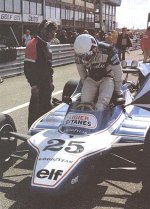 Pironi in his Ligier | Depailler's replacement at Ligier in 1980 was another Frenchman, Didier Pironi. The Ligier that year was blindingly quick, but also somewhat fragile: Pironi lost the Spanish race when a front wheel fell of his car whilst in the lead and at the British Grand Prix both he and team mate Jacques Laffite suffered identical punctures whilst leading comfortably, the cause being the gorgeous silver wheels the team had made specially for the race. At least they had looked terrific. For '81 Pironi made the move to Ferrari to team up with the most flamboyant racer of the '80s, the awe inspiring Gilles Villeneuve. Many motor sport writers have said that Ayrton Senna was the greatest driver in the history of the sport, but that Villeneuve was the best to watch. He certainly had charisma in abundance, and was certainly always one to give 110% effort, regardless of the circumstances. In one wet practise session for the American Grand Prix at Watkins Glen, I seem to recall that he was at least five (or was it fifteen!) seconds a lap faster than anyone else. In a sport where tenths of seconds are lifetimes, that is more than extraordinary. |
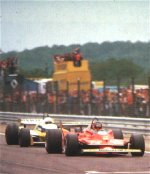 Villeneuve and Arnoux French GP 1979 | Villeneuve came close to the championship in 1979 when he, like Peterson the year before, agreed to stay behind his team mate Jody Scheckter in the Italian race, thereby allowing the South African his first and to date Ferrari's last championship title. Scheckter was the old pro by this time of course, and Villeneuve the young gun. No one doubted that the French-Canadian would have his chance in years to come, but of course life doesn't work that way, particularly in Formula 1. Ferrari went into decline for a couple of years, throughout which Villeneuve never stopped trying, driving his heart out always, regardless of his position in the pack. In 1982 though, it all looked like it might come together, with the fast and pretty 126C2 car developing an unusually high (for Ferrari at the time) level of reliability through the year. Unfortunately, it all came too late for Villeneuve… At Imola at the end of April, the Ferrari pair flew away from the field, with Villeneuve cruising in the lead and Pironi in second. Villeneuve, expecting Pironi to stay behind in team formation, eased up in the last few laps to give a grandstand finish for the cheering tifosi. Pironi, however, had other ideas, the Frenchman passing his unsuspecting teammate on the last lap and taking the flag, leaving a furious Villeneuve in second. The two allegedly never spoke to each other again, and it was under this cloud of distrust and resentment that the tragedy of Zolder on May 8th took place. Villeneuve, never one to take it easy on the racetrack, was driving quickly on his slowing down lap after a fast qualifying lap when he came across the slower March car driven by Jochen Mass. As they approached a bend the cars touched and Villeneuve's scarlet car was flung high into the air. The Ferrari disintegrated on impact with the ground, and as it slammed into a guardrail, the limp body of the driver was thrown like a puppet across the racetrack. Racing accidents are never attractive sights, but this was on a different plane altogether, and it still makes me quiver, seeing it replay in my minds eye now. |
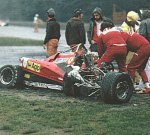 Hockenheim, 1982... | It was difficult to accept that we would not see Gilles Villeneueve race again, and it was difficult not to think that things might have been different if Pironi had stayed behind him in Imola, but then dwelling on what might have beens is never very helpful. It was difficult too, having been a fan of both drivers, to know that an animosity had existed, and there was always some pressure to take sides. I stuck with Pironi though, and always thought he dealt with the pressure of leading the Ferrari team very well under the circumstances (the circumstances being that Gilles was very much the darling of the Ferrari team and their maniacal supporters). Certainly he drove with increasing confidence that year, easily leading the championship when he too was the victim of tragedy, this time at Hockenheim, scene of Depailler's death two years before and also the track that claimed the life of the great Jim Clark. In pouring rain during the practice session, Pironi crashed headfirst into the back of Alain Prost's slowing Renault, shattering both legs and being close to death. The crash was terrible, not least because it echoed the start line crash in Canada earlier in the year in which Pironi's own car was hit from behind by Ricardo Paletti's Osella, the young Italian perishing in the fireball that ensued. 1982 was a pretty tragic year all in all… Despite missing more than a third of the season, Pironi still finished second in the '82 championship, only five points behind winner Keke Rosberg and he was even expected, by some people, to eventually make a comeback to Formula 1. Of course it never happened, although he later made a name for himself in the world of powerboat racing, where violent death finally caught up with him off the coast of England in 1987. After the events of 1982 I started to lose interest in Grand Prix, although I followed with a modicum of interest the exploits of two drivers I had grown to like through the pages of Autosport's coverage of the British Formula Three championship: Stefan Johannson had a strange career, getting chances with Ferrari in '85 and '86 and then McLaren in '87 which he somehow failed to turn to vitory, whilst his teammates of the time gathered successes. Italian playboy Andrea de Cesaris had an even stranger career, gaining a reputation throughout his 13-year career as the man most likely to crash out and being the scourge of James Hunt's tongue on many occasions; something that only served to endear him even more to me, of course. He also, to the best of my knowledge, still holds the record for the most race starts without a victory, although I suspect Martin Brundle now pushes him close for that particular honour… |
 Jacques Villeneuve | I still watch the Grands Prix, and I can still get the same excitement I got when I was a kid, even though these days Formula 1 is even more of a massive global business than it ever was before, and as such has lost some of the outsider charm it had for me at the start. I don't have the same personal passion about any drivers anymore either, although the appearance in 1996 of Jacques Villeneuve, son of Gilles, who entered the arena fresh from success in the USA certainly got my heart racing again. It was good to see a Villeneuve back, showing the same levels of commitment and obvious passion as his father had before him, and being equally determined to speak his mind freely. And of course he won the championship that his father should have taken many years ago… Above all else though, I still watch the Grands Prix because they are not soccer matches, because as a sport it is still not the one that all the kids on the classroom talk about, because it is still, despite the increasing importance of 'team work', a spectacle of the individual. © Alistair Fitchett 1999 |